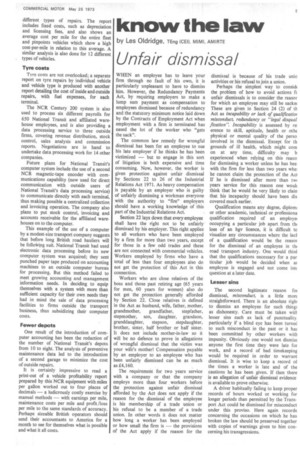know the law
Page 59

If you've noticed an error in this article please click here to report it so we can fix it.
by Les Oldridge, TEng (CEI), MIMI, AMIRTE
Unfair dismissal
WHEN an employee has to leave your firm through no fault of his own, it is particularly unpleasant to have to dismiss him. However, the Redundancy Payments Act, by requiring employers to make a lump sum payment as compensation to employees dismissed because of redundancy and the statutory minimum notice laid down by the Contracts of Employment Act when employment with a firm is terminated has eased the lot of the worker who "gets the sack".
The common law remedy for wrongful dismissal has been for an employee to sue his late employer if he thinks he has been victimized — but to engage in this sort of litigation is both expensive and time consuming. Now, however, the worker is given protection against unfair dismissal by Sections 22 to 26 of the Industrial Relations Act 1971. As heavy compensation is payable by an employer who is guilty of unfairly dismissing a workman everyone with the authority to "fire" employers should have a working knowledge of this part of the Industrial Relations Act.
Section 22 lays down that every employee shall have the right not to be unfairly dismissed by his employer. This right applies to all workers who have been employed by a firm for more than two years, except for those in a few odd trades .and these are not connected with commercial vehicles. Workers employed by firms who have a total of less than four employees also do not get the protection of this Act in this connection.
Workers who are close relatives of the boss and those past retiring age (65 years for men, 60 years for women) also do not get the protection generally afforded by Section 22. Close relatives is defined in the Act as husband, wife, father, mother, grandmother, grandfather, stepfather, stepmother, son, daughter, grandson, granddaughter, stepson, stepdaughter, brother, sister, half brother or half sister. It does not include mother-in-law so it will be no defence to prove in allegations of wrongful dismissal that the victim was your wife's mother! Compensation payable by an employer to an employee who has been unfairly dismissed can be as much as £4,160.
The requirement for two years service with a company or that the company employs more than four workers before the protection against unfair dismissal afforded by the Act does not apply if the reason for the dismissal of the employee is his membership of a trade union or his refusal to be a member of a trade union. In other words it does not matter how long a worker has been employed or how small the firm is — the provisions of the Act apply if the reason for the dismissal is because of his trade unio activities or his refusal to join a union.
Perhaps the simplest way to considi the problem of how to avoid actions fc unfair dismissals is to consider the reasor for which an employee may still be sackec These are given in Section 24 (2) of th Act as incapability or lack of qualificatior misconduct, redundancy or "legal disqual fication". Incapability is assessed by rei erence to skill, aptitude, health or othe physical or mental quality of the perso involved in the dismissal. Except for th grounds of ill health, which might corn on at any time, difficulty may b experienced when relying on this reaso. for dismissing a worker unless he has beei with the firm for less than two years whei he cannot claim the protection of. the Act If he is dismissed after more than ts.vi years service for this reason one woult think that he would be very likely to clain that his incapacity should have been dis covered much earlier.
Qualification means any degree, diploma or other academic, technical or professiona qualification required of an employe' occupying a particular job apart from du loss of an hgv licence, it is difficult to visualize any circumstances where the ladl of a qualification would be the reasor for the dismissal of an employee in till road transport industry. One would thinl that the qualifications necessary for a par ticular job would be decided when ar employee is engaged and not come intc question at a later date.
Lesser sins
The second legitimate reason foi dismissal, misconduct, is a little more straightforward. There is an absolute righl to dismiss an employee for such thing5 as dishonesty. Care must be taken witt lesser sins such as lack of punctuality particularly if a blind eye has been turned to such misconduct in the past or it has been committed by other workers with impunity. Obviously one would not dismiss anyone the first time they were late for work, and a record of bad timekeeping would be required in order to warrant dismissal. It is wise to keep a record of the times a worker is late and of the cautions he has been given. If then there is an allegation of unfair dismissal evidence is available to prove otherwise.
A driver habitually failing to keep proper records of hours worked or working for longer periods than permitted by the Transport Act could be dismissed for misconduct under this proviso. Here again records concerning the occasions on which he has broken the law should be preserved together with copies of warnings given to him concerning his transgressions.
























































































































































